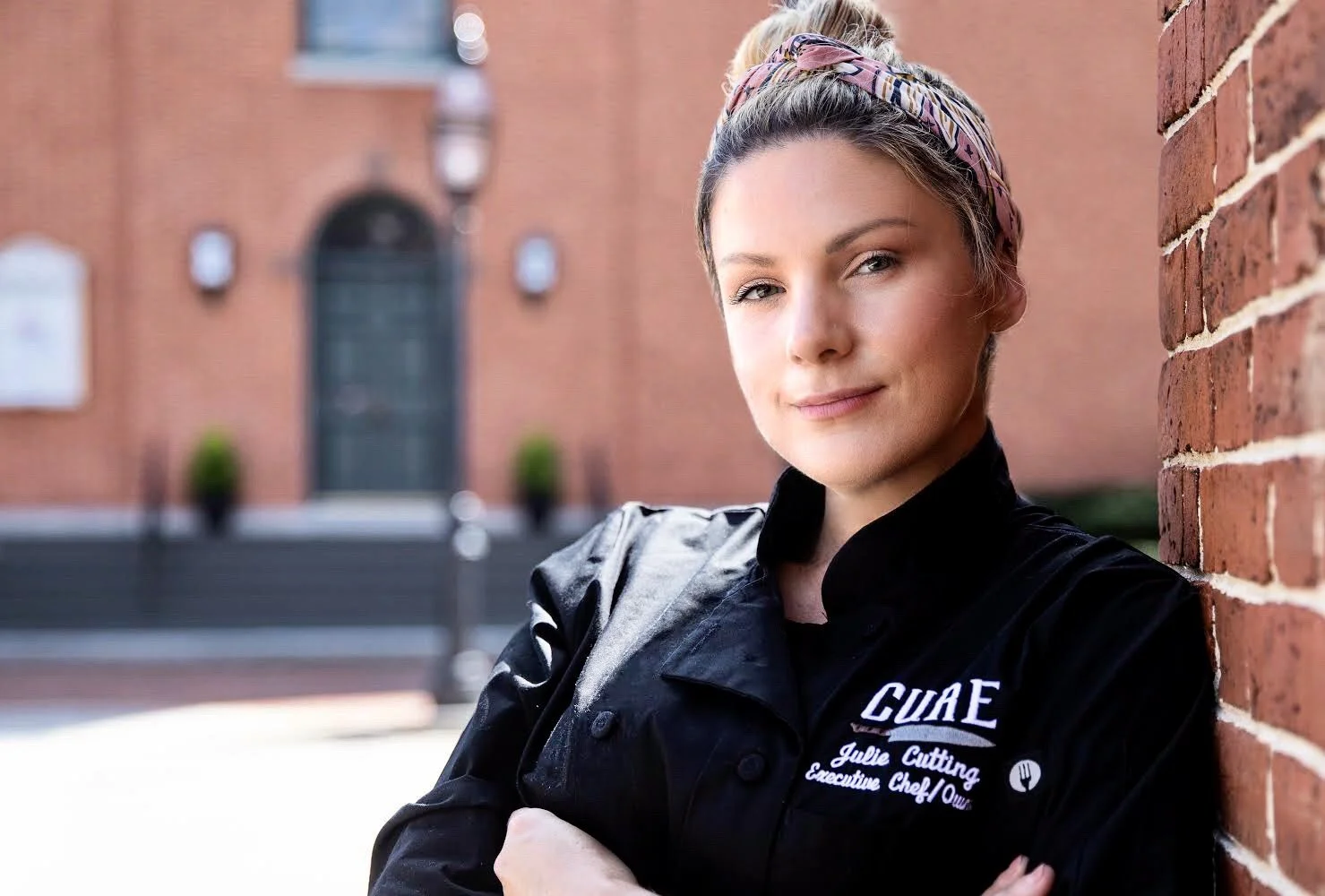When profits plummeted up to 70% in the fall, the owner of Cure Restaurant in Portsmouth knew that she had to get creative.
By Kelly Burch, Granite State News Collaborative
When asked about how the pandemic has impacted her business, Julie Cutting, owner and executive chef of Cure Restaurant in Portsmouth, struggled to find the words.
Julie Cutting, owner of Cure Restaurant in Portsmouth, had to get creative to make up for a fall sales slump. (Courtesy photo)
“Let me put myself back into that moment of March 13, [2020],” she said, pausing.
Cutting opened Cure in January 2014, providing upscale comfort food to the seacoast region. Before the pandemic, she had about 20 staff. When her daughter was born two years ago, Cutting moved out of the kitchen and spent more time managing and hosting the restaurant than preparing food. She was in a good routine, until the pandemic turned it upside down.
“The restaurant was at a point where it would run itself,” Cutting said. “Then, you’re back to trying to throw things against the wall to see what will stick to keep you in the green.”
At first, the restaurant switched to takeout only, but Cutting soon realized the business would be better off if she closed during the stay at home order. Cutting had to lay off most of her staff, but she, her husband and the head chef stayed to complete projects like painting the restaurant and reconfiguring the dining room.
“We always kept it going and didn’t go into a hibernation state,” Cutting said.
When the stay at home order lifted, Cure was ready. The city of Portsmouth agreed to allow sidewalk dining. In addition, Cure already had a patio area connected to the restaurant with French doors. Utilizing those two sections, Cutting had more seats available than before the pandemic. With more people staying home this summer, the restaurant filled with locals. Although sales were down about 7% compared with the summer before, Cutting was happy with how Cure was faring.
“The summer was very good for us,” Cutting said. “Come into fall, it was a different story.”
During some weeks in November, sales were down as much as 69% compared to 2019. Cutting had brought back about three-quarters of her staff, but with sales plummeting she was facing the prospect of laying one quarter of them off again.
Cutting had tried to open seven days a week, but the demand just wasn’t there. She decided to close the doors on Mondays and Tuesdays. She invested in a high-quality tent that allows her to use the patio space even now, in the coldest portion of the New Hampshire winter. Although it took resources, she’s confident that the tent will pay for itself by making patio seating a constant.
“That tent is going to be profitable for me for years to come,” she said.
Cutting’s biggest shift was emphasizing and promoting take-out. Before the pandemic she had never considered takeout, but she realized that her menu items were well-suited to go. She tested different ways of packaging and presenting foods so that guests had the same high-quality dining experience at home that they could have in the restaurant.
“I make sure it has the same value at home as it would if you were at the table,” Cutting said.
Her clientele responded: some week days, take-out makes up about 45% of sales at the restaurant.
“With the outdoor space and the takeout, we are slightly in the green right now,” Cutting said.
The past year has been challenging for Cutting, but she said that it’s allowed her to run her business better and more efficiently. Although sanitization has always been a priority in the restaurant, it’s now at a whole new level, Cutting said. Now, in addition to thinking about ordering ingredients and liquor, Cutting is keeping up with the latest health guidelines and understanding what her customers want from the restaurant.
“I really have to use a different part of my brain than during the day-to-day,” she said. “I had to get creative and widen [the] business model.”
Nearly a year into those adjustments, Cutting is happy with her response.
“I’m really proud of the efforts we’ve put in, and that the community can still count on us to be here to celebrate a birthday or anniversary,” she said. “We’re changing our business plan to adapt to the pandemic, but still be there for loyal customers.”
This story is part of the 50 Businesses, 50 Solutions series, shared by partners in The Granite State News Collaborative, that aims to highlight how business leaders across the state, from mom and pop shops, to large corporations have adapted to meet the challenges and disruptions caused by the novel coronavirus in the hopes others may be able to replicate these ideas and innovations. Tell us your story here. For more information visit collaborativenh.org.

